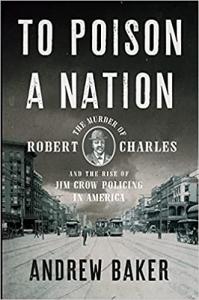 To Poison a Nation: The Murder of Robert Charles and the Rise of Jim Crow Policing in America
To Poison a Nation: The Murder of Robert Charles and the Rise of Jim Crow Policing in America
The New Press, 2021
Agent: Elise Capron
An explosive, long-forgotten story of police violence that exposes the historical roots of today's criminal justice crisis
On a steamy Monday evening in 1900, New Orleans police officers confronted a black man named Robert Charles as he sat on a doorstep in a working-class neighborhood where racial tensions were running high. What happened next would trigger the largest manhunt in the city's history, while white mobs took to the streets, attacking and murdering innocent black residents during three days of bloody rioting. Finally cornered, Charles exchanged gunfire with the police in a spectacular gun battle witnessed by thousands.
Building outwards from these dramatic events, To Poison a Nation connects one city's troubled past to the modern crisis of white supremacy and police brutality. Historian Andrew Baker immerses readers in a boisterous world of disgruntled laborers, crooked machine bosses, scheming businessmen, and the black radical who tossed a flaming torch into the powder keg. Baker recreates a city that was home to the nation's largest African American community, a place where racial antagonism was hardly a foregone conclusion—but which ultimately became the crucible of a novel form of racialized violence: modern policing.
A major new work of history, To Poison a Nation reveals disturbing connections between the Jim Crow past and police violence in our own times.
Reviews:
“An eye-opening excavation of a little-known American tragedy.”
—Publishers Weekly
“A sturdy addition to the literature on the early period of the Jim Crow era.”
—Kirkus Reviews
“This straightforward recounting of a notable, sometimes forgotten moment in American history deserves attention; the riots’ lingering effects are still felt in the 21st century.”
—Library Journal
"A brilliantly conceived narrative written with meticulous attention to detail, this book offers a stunning indictment of American politics and an inspired vision of a possible road to redemption—interracial social democracy—a pathway from the past that might still be taken forward."
—Vincent Brown, author of Tacky's Revolt: The Story of an Atlantic Slave War
"A deeply researched and propulsively written story of corrupt governance, police brutality, Black resistance, and violent white reaction in turn-of-the-century New Orleans that holds up a dark mirror to our own times."
—Walter Johnson, author of River of Dark Dreams